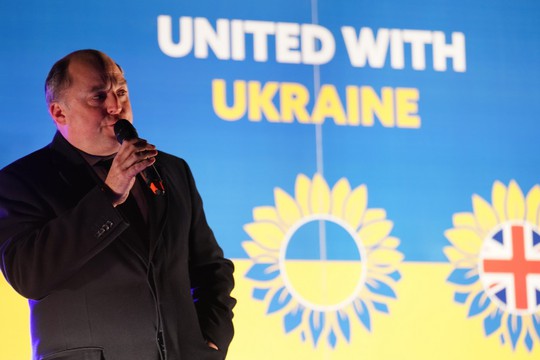UK Defence Secretary Ben Wallace
The NATO Summit in Vilnius on June 11-12 turned out to be an anti-climax with the fractured relationship between the regime in Kyiv and the Western powers surging. What is happening is more of an implosion than a Russian conspiracy, writes M.K. Bhadrakumar, Indian Ambassador and prominent international observer.
Certainly, the announcement by the UK Defence Secretary Ben Wallace that he will be leaving the cabinet and quitting politics is much more than about himself or British politics.
Wallace had a special role in the Ukraine war, being the oldest member of the British cabinet at 52, a Sandhurst-trained soldier-politician who is well-liked in the NATO establishment at Brussels and an influential pillar of the Deep State in the UK, and, most important, a British politician who had close rapport with the leadership in Kyiv and could influence the war more effectively than any European leader with the exception of Boris Johnson.
Wallace made the announcement just after the NATO’s Vilnius summit where he levelled some sharp criticism against the Kyiv regime, which probably echoed a widely held sentiment among the allies. Of course, he upset the regime in Kyiv — and probably10 Downing Street too for being so blunt at a time when nerves were fraught as NATO’s signal was not convincing enough for Zelensky. Zelensky publicly mocked Wallace, further embarrassing the Brits.
Wallace’s exit will spawn many theories, but to my mind, President Joe Biden’s vetoing of his candidacy for the post of the next secretary-general of the NATO played a significant part. Biden’s snub must be hard to stomach at a personal level.
Why was Biden so staunchly opposed to the British proposal nominating Wallace as the next NATO chief? Evidently, the UK saw the secretary-generalship of NATO as a leap forward in its “Global Britain” project, as it desperately gnaws its way up the greasy pole of big-power politics. And the NATO establishment was positive about it.
Make no mistake that Biden’s authorisation to deploy US reserve troops in Europe is a case in point underscoring why the White House will want to continue to exercise total control over the alliance system in Europe in the short and medium term.
Will Wallace’s departure make much difference to Britain’s involvement in the Ukraine war? The answer is no.
Undoubtedly, he was next only to Boris Johnson in his commitment to bleed and inflict a military defeat on Russia. During his watch, Britain took a lead role in providing Ukraine with long-range missiles and set an example. It is virtually certain that the SAS played a key role in most, if not all, of Kyiv’s attacks on Russian territory. Wallace has been a solid pillar of the Deep State — and he almost made it to 10 Downing Street.
But, on the other hand, in a potential continental war, the British army today is a pale shadow of what it used to be — with a measly stockpile of 40 battle tanks in its inventory and a standing army of 78,060 active personnel, 27,570 Volunteer Reserve and 4060 Gurkhas. Probably, it weighed on Wallace…
Who can say Wallace’s departure has nothing to do with Ukraine war?
But the intriguing part is that although Wallace has powerful supporters in the US, no one intervened to discourage him from throwing in the towel and walking away from the ring.
read more in our Telegram-channel https://t.me/The_International_Affairs

 11:14 20.07.2023 •
11:14 20.07.2023 •























